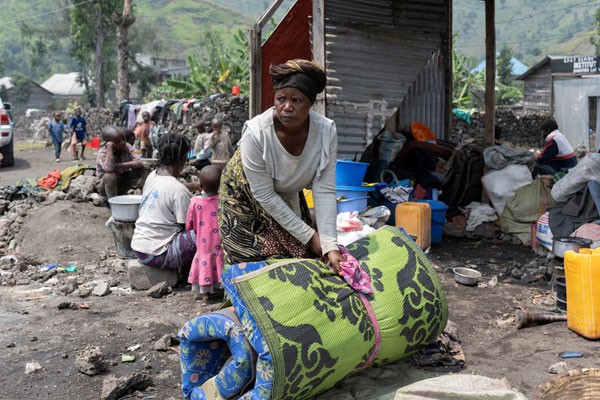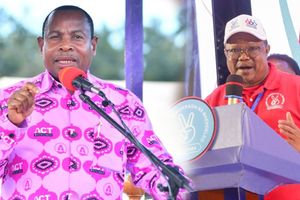Uganda sends 1,000 more soldiers to east Congo near M23 conflict

UPDF soldiers during Operation Shujaa in the DRC. In January 2023, then Defence Minister Vincent Ssempijja, told Parliament’s Defence Committee that his ministry urgently needed Shs21.5b for the mission. PHOTO | FILE.
What you need to know:
- With Rwanda backing M23, fears of regional escalation rise
Uganda has deployed more than 1,000 extra soldiers into east Congo in the last week near an area where the Kinshasa government is fighting M23 rebels, four diplomatic and UN sources said, heightening fears of a regional escalation.
Residents said they were moving towards the conflict zone.
The Rwandan-backed M23 recently captured regional capital Goma in an anarchic and mineral-rich part of Democratic Republic of Congo where wars in 1996-1997 and 1998-2003 drew in outside nations and killed millions, mostly from hunger and disease.
The extra Ugandan deployment north of Goma would raise its numbers there - officially to back Congo President Felix Tshisekedi's army against another rebel force - to about 4,000-5,000, according to U.N. sources.
Rwanda also has troops operating in east Congo.
Uganda has been helping Congo fight the Islamist Allied Defence Forces since 2021, and the new deployment of between 1,000-2,000 troops was under that auspice in a push called Operation Shujaa, the sources said.
In a region of complex and often-shifting alliances, U.N. experts say Uganda has also backed the ethnic Tutsi-led M23, which is the latest in a string of Rwanda-backed rebellions to take up arms in the name of Congo's Tutsis.
Residents in the town of Butembo told Reuters they had seen columns of Ugandan soldiers heading south towards the front line with the M23 since the weekend.
Ugandan army spokesperson Felix Kulayigye denied a major new deployment, saying its forces had changed their "posture to offensive defence", without giving further details.
Congo's Communications Minister Patrick Muyaya did not respond when asked if more troops had arrived, but stressed the priority of Ugandan soldiers in the area was to fight the ADF though combat against M23 and Rwandan soldiers was also possible.
"There's still a lot of suspicion about Uganda, a lot of suspicion about what's generally happening with the M23," he told Reuters.
UGANDA'S 'SURGE'
Corneille Nangaa, head of the Alliance Fleuve Congo, an umbrella organisation that includes the M23 fighters, told Reuters that Uganda provided no support but nor did he expect hostility.
Uganda denies U.N. reports that it has helped train some M23 fighters and given the group a rear base to move men and arms.
Having seized much of North Kivu province, M23 rebels have been consolidating their hold on Goma and moving on Bukavu, a town some 200 km (125 miles) to the south. After meeting resistance from Congolese and Burundian forces, they have said they do not plan to take the city.
Uganda and Rwanda have both entered east Congo in the past in the name of protecting their borders but faced accusations of looting natural resources, especially gold.
Zobel Behalal, a senior expert at the Global Initiative Against Transnational Organized Crime think tank, said eastern Congo is as important for Uganda's economy as it is for Rwanda's, and the country would do what it needed to protect its interests.
"The surge is preparation for this," he said, referring to Uganda's efforts to ensure that it managed any spreading conflict so that it continued to benefit from wealth and trade over their shared border.
Uganda has been helping Tshisekedi's army hunt down the Islamic State-allied ADF which originated in Uganda but has been based in Congo since the late 1990s. Ground and air attacks have disrupted ADF operations and forced them to flee strongholds.
Adding to concerns over Uganda's potentially ambiguous position, Muhoozi Kainerugaba, the influential son of Uganda's president and head of the military, has been publicly supportive of Rwanda's President Paul Kagame and his government.
In 2022, he referred to M23 as "brothers of ours" fighting for the rights of Tutsis in Congo.





